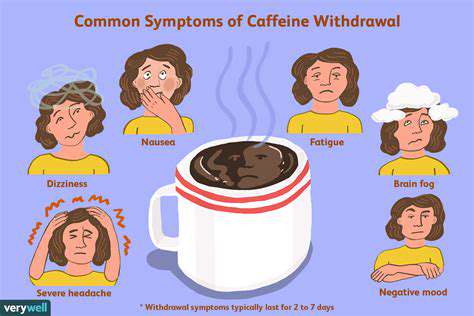Coping with Caffeine Withdrawal and Its Anxiety Effects

Understanding Caffeine's Impact
Many people underestimate how deeply caffeine affects their daily functioning. This powerful stimulant, present in everything from morning coffee to chocolate bars, alters brain chemistry in ways we're only beginning to understand. The effects creep into every corner of our lives, influencing how alert we feel, how well we sleep, and even our emotional stability.
What most don't realize is caffeine works by mimicking adenosine, tricking our brains into staying awake when we should feel tired. This biological deception creates the energy boost we crave, but at a cost. The temporary alertness comes with potential long-term consequences for our natural sleep-wake cycles and stress responses.
Caffeine's Hidden Presence
You might be consuming caffeine without even knowing it. Beyond the obvious sources like coffee and energy drinks, this stimulant sneaks into unexpected places - certain pain relievers, weight loss supplements, and even some flavored waters. This stealthy infiltration makes tracking your actual intake surprisingly difficult.
Reading labels becomes crucial when you realize how many products contain hidden caffeine. Many consumers experience unexplained jitters or sleep disturbances simply because they didn't account for these covert sources. For those sensitive to caffeine's effects, this oversight can significantly impact daily functioning.
When Your Body Rebels
Regular caffeine use creates physical dependence, meaning your nervous system adjusts its chemistry to accommodate the daily stimulant. When you suddenly remove caffeine, your body protests with withdrawal symptoms that can feel like illness. These reactions - headaches, brain fog, and mood swings - demonstrate how profoundly caffeine alters normal physiology.
The intensity of withdrawal symptoms directly reflects how much your body had adapted to caffeine's presence. Those who consume multiple cups daily often experience more severe reactions when stopping abruptly. This biological response underscores why gradual reduction works better than sudden cessation for most people.
Listening to Your Body's Signals
Individual responses to caffeine vary dramatically. Some people can drink espresso before bed and sleep soundly, while others feel anxious from a single cup of tea. These differences stem from genetic variations in how quickly we metabolize caffeine and how sensitive our nervous systems are to its effects.
Your body provides clear feedback about your caffeine tolerance if you learn to interpret the signals. Trouble sleeping, midday crashes, or increased anxiety after consumption all suggest you might benefit from reducing intake. Ignoring these signs often leads to worsening symptoms over time.
Creating a Sustainable Relationship
Developing a healthy approach to caffeine requires honesty about your consumption and its effects. Practical strategies include keeping a consumption journal, identifying trigger times when you crave caffeine most, and experimenting with gradual reduction methods. The goal isn't necessarily complete elimination, but rather finding your personal optimal level.
Mindful consumption transforms caffeine from a necessity to a conscious choice. When you understand exactly how it affects you, you can use it strategically rather than compulsively. This shift in perspective often leads to better energy management throughout the day without the rollercoaster of spikes and crashes.
The Science Behind the Jitters: How Caffeine Affects Anxiety

Your Body's Alarm System
The uncomfortable jitters many experience after too much coffee represent your nervous system in overdrive. These physical sensations are essentially your body preparing for danger that doesn't exist. Caffeine amplifies this response by stimulating adrenaline production, creating physical symptoms identical to those of genuine anxiety - racing heart, trembling hands, and that unsettling feeling of impending doom.
This biochemical reaction evolved to help us survive immediate threats, not handle modern stressors. When caffeine triggers this response repeatedly without real danger, it can sensitize your nervous system, making you more prone to anxiety even without caffeine's influence.
The Thought-Anxiety Cycle
Physical anxiety symptoms often trigger anxious thoughts, which then worsen the physical symptoms - a vicious cycle that caffeine can initiate or exacerbate. Many people don't realize their morning coffee might be fueling afternoon anxiety episodes. The temporary alertness comes with hidden costs for those predisposed to anxiety.
This cycle becomes particularly problematic when people use more caffeine to combat the fatigue that follows an anxiety episode. The solution (more caffeine) actually worsens the original problem, creating a self-perpetuating pattern of anxiety and caffeine consumption.
Breaking the Pattern
Effective management starts with recognizing caffeine's role in your anxiety patterns. Simple awareness of how caffeine affects you personally can be transformative. Many find that reducing caffeine significantly decreases both the frequency and intensity of their anxiety symptoms.
Practical strategies include switching to lower-caffeine alternatives at certain times of day, practicing breathing techniques when jitters occur, and ensuring you're well-hydrated (since dehydration can mimic and worsen anxiety symptoms). The key is observing your personal responses and adjusting accordingly.
Managing Withdrawal Anxiety: Practical Strategies for a Smooth Transition
Understanding the Transition
Withdrawal anxiety represents your body's adjustment to functioning without its accustomed chemical support. It's not weakness - it's physiology. The discomfort you feel reflects real neurological changes as your brain rebalances its chemistry. Recognizing this as a temporary adjustment period, not a personal failing, makes the process more manageable.
Different people experience withdrawal differently based on factors like genetics, usual intake, and overall health. Some sail through with minor headaches, while others face days of fatigue and irritability. Knowing your personal pattern helps you prepare appropriate coping strategies.
Building Your Support Network
Don't underestimate the power of social support during caffeine reduction. Telling friends or family about your goals creates accountability and understanding when you're irritable or tired. Consider finding a quitting buddy - someone reducing caffeine at the same time for mutual support.
Professional guidance can be invaluable if you're struggling. Nutritionists can suggest dietary supports, while therapists can provide cognitive strategies for managing withdrawal-related mood changes. There's no shame in seeking help for what is essentially a biochemical challenge.
Practical Coping Techniques
Structure helps immensely during withdrawal. Plan your reduction for a relatively low-stress period if possible, and build in extra rest time. Hydration and light exercise can significantly ease symptoms by supporting your body's detoxification processes.
Have replacement strategies ready for when cravings hit. This might mean herbal tea rituals, short walks, or mindfulness exercises. The key is disrupting habitual caffeine routines with healthier alternatives that still provide psychological comfort.
Beyond the Jitters: Nourishing Your Body and Mind During Withdrawal
The Body's Healing Process
Withdrawal symptoms are actually signs your body is recalibrating. The headaches, fatigue, and brain fog represent neurological repair work underway. This perspective shift - viewing symptoms as healing rather than suffering - can make the process more bearable.
Understanding the timeline helps too. Physical symptoms typically peak around day two or three, while mental fogginess might last a week or more. Energy levels often stabilize within two weeks, though sleep improvements might continue for months.
Nutritional Support
Certain nutrients can ease the transition. Magnesium helps with headaches and muscle tension, while B vitamins support energy production. Staying well-hydrated is crucial - many withdrawal symptoms mimic dehydration because caffeine is a diuretic.
Eating regular, balanced meals prevents blood sugar crashes that exacerbate withdrawal symptoms. Include protein with each meal to stabilize energy, and consider reducing sugar intake to avoid energy rollercoasters.
Lifestyle Adjustments
Gentle movement like walking or yoga can boost circulation and mood without overtaxing your adjusting system. Prioritize sleep - your body does its deepest healing during rest. Create a relaxing bedtime routine to compensate for lost caffeine-induced alertness.
Be patient with temporary productivity dips. Your brain is literally rewiring its alertness pathways. Short focused work sessions with frequent breaks often work better than trying to maintain pre-withdrawal productivity levels.
When to Seek Help
While most withdrawal symptoms are normal, consult a healthcare provider if symptoms are severe or persist beyond two weeks. Some medical conditions can mimic or complicate caffeine withdrawal, and individual needs vary.
Remember that the discomfort is temporary, while the benefits of reduced caffeine dependence - better sleep, more stable energy, reduced anxiety - continue accumulating long after withdrawal ends.